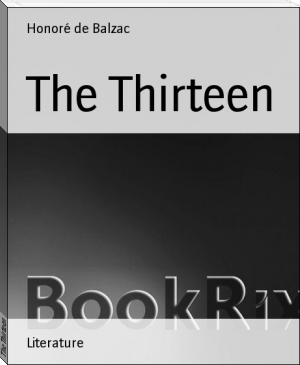The Thirteen - Honoré de Balzac (books to improve english TXT) 📗

- Author: Honoré de Balzac
Book online «The Thirteen - Honoré de Balzac (books to improve english TXT) 📗». Author Honoré de Balzac
"I must be very fond of you, my good dunce, to confide such high thoughts to you," said the young man, who was at that moment having his feet rubbed with a soft brush lathered with English soap.
"Have I not the most devoted attachment to you," replied Paul de Manerville, "and do I not like you because I know your superiority?..."
"You must have noticed, if you are in the least capable of observing any moral fact, that women love fops," went on De Marsay, without replying in any way to Paul's declaration except by a look. "Do you know why women love fops? My friend, fops are the only men who take care of themselves. Now, to take excessive care of oneself, does it not imply that one takes care in oneself of what belongs to another? The man who does not belong to himself is precisely the man on whom women are keen. Love is essentially a thief. I say nothing about that excess of niceness to which they are so devoted. Do you know of any woman who has had a passion for a sloven, even if he were a remarkable man? If such a fact has occurred, we must put it to the account of those morbid affections of the breeding woman, mad fancies which float through the minds of everybody. On the other hand, I have seen most remarkable people left in the lurch because of their carelessness. A fop, who is concerned about his person, is concerned with folly, with petty things. And what is a woman? A petty thing, a bundle of follies. With two words said to the winds, can you not make her busy for four hours? She is sure that the fop will be occupied with her, seeing that he has no mind for great things. She will never be neglected for glory, ambition, politics, art--those prostitutes who for her are rivals. Then fops have the courage to cover themselves with ridicule in order to please a woman, and her heart is full of gratitude towards the man who is ridiculous for love. In fine, a fop can be no fop unless he is right in being one. It is women who bestow that rank. The fop is love's colonel; he has his victories, his regiment of women at his command. My dear fellow, in Paris everything is known, and a man cannot be a fop there _gratis_. You, who have only one woman, and who, perhaps, are right to have but one, try to act the fop!... You will not even become ridiculous, you will be dead. You will become a foregone conclusion, one of those men condemned inevitably to do one and the same thing. You will come to signify _folly_ as inseparably as M. de La Fayette signifies _America_; M. de Talleyrand, _diplomacy_; Desaugiers, _song_; M. de Segur, _romance_. If they once forsake their own line people no longer attach any value to what they do. So, foppery, my friend Paul, is the sign of an incontestable power over the female folk. A man who is loved by many women passes for having superior qualities, and then, poor fellow, it is a question who shall have him! But do you think it is nothing to have the right of going into a drawing-room, of looking down at people from over your cravat, or through your eye-glass, and of despising the most superior of men should he wear an old-fashioned waistcoat?... Laurent, you are hurting me! After breakfast, Paul, we will go to the Tuileries and see the adorable girl with the golden eyes."
When, after making an excellent meal, the two young men had traversed the Terrasse de Feuillants and the broad walk of the Tuileries, they nowhere discovered the sublime Paquita Valdes, on whose account some fifty of the most elegant young men in Paris where to be seen, all scented, with their high scarfs, spurred and booted, riding, walking, talking, laughing, and damning themselves mightily.
"It's a white Mass," said Henri; "but I have the most excellent idea in the world. This girl receives letters from London. The postman must be bought or made drunk, a letter opened, read of course, and a love-letter slipped in before it is sealed up again. The old tyrant, _crudel tirano_, is certain to know the person who writes the letters from London, and has ceased to be suspicious of them."
The day after, De Marsay came again to walk on the Terrasse des Feuillants, and saw Paquita Valdes; already passion had embellished her for him. Seriously, he was wild for those eyes, whose rays seemed akin to those which the sun emits, and whose ardor set the seal upon that of her perfect body, in which all was delight. De Marsay was on fire to brush the dress of this enchanting girl as they passed one another in their walk; but his attempts were always vain. But at one moment, when he had repassed Paquita and the duenna, in order to find himself on the same side as the girl of the golden eyes, when he returned, Paquita, no less impatient, came forward hurriedly, and De Marsay felt his hand pressed by her in a fashion at once so swift and so passionately significant that it was as though he had received the emotions surged up in his heart. When the two lovers glanced at one another, Paquita seemed ashamed, she dropped her eyes lest she should meet the eyes of Henri, but her gaze sank lower to fasten on the feet and form of him whom women, before the Revolution, called _their conqueror_.
"I am determined to make this girl my mistress," said Henri to himself.
As he followed her along the terrace, in the direction of the Place Louis XV., he caught sight of the aged Marquis de San-Real, who was walking on the arm of his valet, stepping with all the precautions due to gout and decrepitude. Dona Concha, who distrusted Henri, made Paquita pass between herself and the old man.
"Oh, for you," said De Marsay to himself, casting a glance of disdain upon the duenna, "if one cannot make you capitulate, with a little opium one can make you sleep. We know mythology and the fable of Argus."
Before entering the carriage, the golden-eyed girl exchanged certain glances with her lover, of which the meaning was unmistakable and which enchanted Henri, but one of them was surprised by the duenna; she said a few rapid words to Paquita, who threw herself into the _coupe_ with an air of desperation. For some days Paquita did not appear in the Tuileries. Laurent, who by his master's orders was on watch by the hotel, learned from the neighbors that neither the two women nor the aged marquis had been abroad since the day upon which the duenna had surprised a glance between the young girl in her charge and Henri. The bond, so flimsy withal, which united the two lovers was already severed.
Some days later, none knew by what means, De Marsay had attained his end; he had a seal and wax, exactly resembling the seal and wax affixed to the letters sent to Mademoiselle Valdes from London; paper similar to that which her correspondent used; moreover, all the implements and stamps necessary to affix the French and English postmarks.
He wrote the following letter, to which he gave all the appearances of a letter sent from London:--
"MY DEAR PAQUITA,--I shall not try to paint to you in words the
passion with which you have inspired me. If, to my happiness, you
reciprocate it, understand that I have found a means of
corresponding with you. My name is Adolphe de Gouges, and I live
at No. 54 Rue de l'Universite. If you are too closely watched to
be able to write to me, if you have neither pen nor paper, I shall
understand it by your silence. If then, to-morrow, you have not,
between eight o'clock in the morning and ten o'clock in the
evening, thrown a letter over the wall of your garden into that of
the Baron de Nucingen, where it will be waited for during the
whole of the day, a man, who is entirely devoted to me, will let
down two flasks by a string over your wall at ten o'clock the next
morning. Be walking there at that hour. One of the two flasks will
contain opium to send your Argus to sleep; it will be sufficient
to employ six drops; the other will contain ink. The flask of ink
is of cut glass; the other is plain. Both are of such a size as
can easily be concealed within your bosom. All that I have already
done, in order to be able to correspond with you, should tell you
how greatly I love you. Should you have any doubt of it, I will
confess to you, that to obtain an interview of one hour with you I
would give my life."
"At least they believe that, poor creatures!" said De Marsay; "but they are right. What should we think of a woman who refused to be beguiled by a love-letter accompanied by such convincing accessories?"
This letter was delivered by Master Moinot, postman, on the following day, about eight o'clock in the morning, to the porter of the Hotel San-Real.
In order to be nearer to the field of action, De Marsay went and breakfasted with Paul, who lived in the Rue de la Pepiniere. At two o'clock, just as the two friends were laughingly discussing the discomfiture of a young man who had attempted to lead the life of fashion without a settled income, and were devising an end for him, Henri's coachman came to seek his master at Paul's house, and presented to him a mysterious personage who insisted on speaking himself with his master.
This individual was a mulatto, who would assuredly have given Talma a model for the part of Othello, if he had come across him. Never did any African face better express the grand vengefulness, the ready suspicion, the promptitude in the execution of a thought, the strength of the Moor, and his childish lack of reflection. His black eyes had the fixity of the eyes of a bird of prey, and they were framed, like a vulture's, by a bluish membrane devoid of lashes. His forehead, low and narrow, had something menacing. Evidently, this man was under the yoke of some single and unique thought. His sinewy arm did not belong to him.
He was followed by a man whom the imaginations of all folk, from those who shiver in Greenland to those who sweat in the tropics, would paint in the single phrase: _He was an unfortunate man_. From this phrase, everybody will conceive him according to the special ideas of each country. But who can best imagine his face--white and wrinkled, red at the extremities, and his long beard. Who will see his lean





Comments (0)